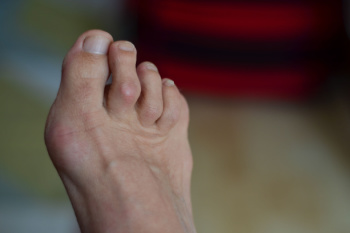(517) 487-5171
Fax (517) 908-0172
Facts About Hammertoe
Tuesday, 09 July 2024 00:00 Hammertoe is a deformity causing one or more of the smaller toes to bend abnormally at the middle joint, resembling a hammer. This condition arises primarily due to muscle imbalances that lead to increased pressure on the tendons and joints of the toe. Common causes include wearing ill-fitting shoes, particularly those that are too tight or have high heels, as well as genetic predispositions and conditions like arthritis. Symptoms of hammertoe include pain or irritation while wearing shoes, corns and calluses on the toe, redness and swelling, and in severe cases, open sores. The affected toe may become rigid over time, making movement difficult and painful. Preventing hammertoe involves wearing properly fitting shoes with adequate toe room, avoiding high heels, and performing toe-stretching exercises to maintain flexibility. Early intervention is key to managing the condition effectively. Treatment options range from non-surgical methods, such as wearing custom orthotic devices, using padding to reduce pressure, and taking anti-inflammatory medications, to surgical procedures for severe cases where the toe has become rigid. Surgery typically involves realigning the toe and correcting the deformity. Complications of untreated hammertoe can include chronic pain, difficulty in walking, and persistent sores or infections, which can lead to further foot problems. If you have an uncomfortable hammertoe, it is suggested that you visit a podiatrist for an accurate diagnosis and a tailored treatment plan.
Hammertoe is a deformity causing one or more of the smaller toes to bend abnormally at the middle joint, resembling a hammer. This condition arises primarily due to muscle imbalances that lead to increased pressure on the tendons and joints of the toe. Common causes include wearing ill-fitting shoes, particularly those that are too tight or have high heels, as well as genetic predispositions and conditions like arthritis. Symptoms of hammertoe include pain or irritation while wearing shoes, corns and calluses on the toe, redness and swelling, and in severe cases, open sores. The affected toe may become rigid over time, making movement difficult and painful. Preventing hammertoe involves wearing properly fitting shoes with adequate toe room, avoiding high heels, and performing toe-stretching exercises to maintain flexibility. Early intervention is key to managing the condition effectively. Treatment options range from non-surgical methods, such as wearing custom orthotic devices, using padding to reduce pressure, and taking anti-inflammatory medications, to surgical procedures for severe cases where the toe has become rigid. Surgery typically involves realigning the toe and correcting the deformity. Complications of untreated hammertoe can include chronic pain, difficulty in walking, and persistent sores or infections, which can lead to further foot problems. If you have an uncomfortable hammertoe, it is suggested that you visit a podiatrist for an accurate diagnosis and a tailored treatment plan.
Hammertoe
Hammertoes can be a painful condition to live with. For more information, contact Dr. Gary Cesar from Michigan Foot and Ankle Center. Our doctor will answer any of your foot- and ankle-related questions.
Hammertoe is a foot deformity that affects the joints of the second, third, fourth, or fifth toes of your feet. It is a painful foot condition in which these toes curl and arch up, which can often lead to pain when wearing footwear.
Symptoms
- Pain in the affected toes
- Development of corns or calluses due to friction
- Inflammation
- Redness
- Contracture of the toes
Causes
Genetics – People who are genetically predisposed to hammertoe are often more susceptible
Arthritis – Because arthritis affects the joints in your toes, further deformities stemming from arthritis can occur
Trauma – Direct trauma to the toes could potentially lead to hammertoe
Ill-fitting shoes – Undue pressure on the front of the toes from ill-fitting shoes can potentially lead to the development of hammertoe
Treatment
Orthotics – Custom made inserts can be used to help relieve pressure placed on the toes and therefore relieve some of the pain associated with it
Medications – Oral medications such as anti-inflammatories or NSAIDs could be used to treat the pain and inflammation hammertoes causes. Injections of corticosteroids are also sometimes used
Surgery – In more severe cases where the hammertoes have become more rigid, foot surgery is a potential option
If you have any questions please contact our offices located in Lansing and Mt. Pleasant, MI . We offer the newest diagnostic and treatment technologies for all your foot and ankle needs.








